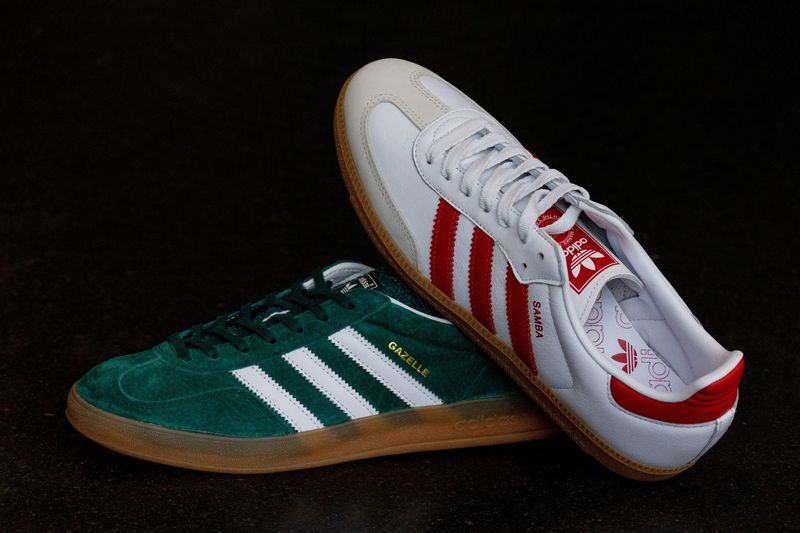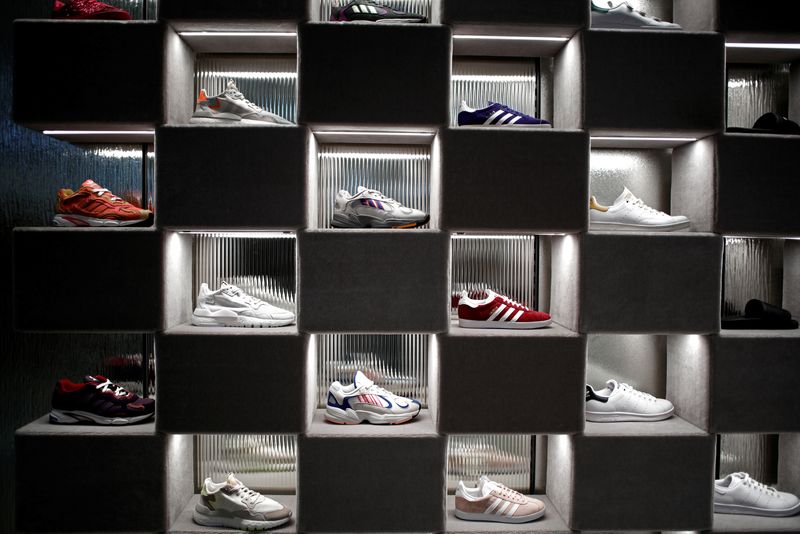By Helen Reid
LONDON (Reuters) - As Adidas (OTC:ADDYY) aims to build on hot demand for its three-striped white and black Samba and multi-coloured Gazelle sneakers, it's also taking steps to prevent the shoes from becoming victims of their own success.
The German sportswear giant ramped up production of the sneakers, known as "terrace shoes" and inspired by soccer fans' footwear in the 1970s and 80s. Sales subsequently jumped from a couple of hundred thousand pairs a month at the start of last year to millions of pairs a month, according to CEO Bjorn Gulden, with Adidas now looking to further increase their popularity.
The company said terrace shoe sales helped drive its strong performance in the first quarter, without giving detailed figures for the Samba, Gazelle and Spezial. The shoes are priced at around $90 and up, with limited edition collaborations costing up to $350.
Investors and analysts are watching closely for signs of Adidas becoming overly reliant on the shoes, with the abrupt ending of the highly profitable Yeezy business still fresh in their memories. Adidas made a loss last year for the first time in 30 years after its break-up with U.S. rapper and producer Kanye West brought that trendy sneaker line to an end.
The Adidas Samba won Footwear News' 2023 "Shoe of the Year" award, the first win for the brand since the Yeezy Boost 350 in 2015.
Bernstein analyst Aneesha Sherman estimates the terrace shoes will drive 1.5 billion euros ($1.61 billion) of sales this year, around 7% of Adidas' overall revenue and close to the 1.7 billion euros Yeezy brought in at its peak.
She predicts terrace shoe sales will likely peak in all regions this year.
"Obviously and clearly, this trend will not last forever," said Thomas Joekel, portfolio manager at Frankfurt-based asset manager Union Investment, which holds Adidas shares.
"At the end of the day, the consumer decides, and companies like Nike (NYSE:NKE) or Adidas have to be agile to jump on these trends."
When British Prime Minister Rishi Sunak was seen sporting Sambas in a clip posted on Instagram earlier this month, some Britons felt he had dealt a blow to the shoe's street cred. Sunak later jokingly apologised to "the Samba community", but CEO Gulden said Sunak's penchant for the shoe had had no impact on sales.
LIMITED EDITIONS
Broader trend cycles can be bruising for the big sportswear makers. In 2018, Adidas sales in Europe, its biggest market, fell when its minimalist white Stan Smith shoes started to go out of fashion. And Nike is currently scaling back supply of its classic Air Jordan 1 shoes due to weaker demand.
So Adidas is trying to spread its bets. Its chunkier, skater-style Campus shoes are becoming more popular and out-selling the Samba in some markets, Gulden said. Adidas also plans to ramp up marketing of its classic Superstar shoe to drive a renewed trend for it next year.
It recently launched a $200 version of the shoe with designer Edison Chen, featuring a rippled sole. Gulden said Adidas has been working to clear the market of seasonal colours of the Superstar, focusing only on the classic black and white, so as to make sure the market is “fresh” for new launches later this year and next.
"We will maintain the current franchises, and then time the activation of Superstar as we and the retailers need it," Gulden said. "We will not push it globally in huge volumes. We will hold it back and let the consumer decide when he or she wants the Superstar."
Bringing out more expensive limited-edition versions in collaboration with designers, like the $350 Y-3 Gazelle with Japanese fashion designer Yohji Yamamoto, is one way to keep a product in fashion.
“What Adidas and Nike are doing with some of their product is trying to follow the luxury playbook – premiumisation, exclusivity, restricting supply, making it all more desirable so you can have bigger margins and create a halo effect for the brand,” said Matt Clark, retail expert at consultancy AlixPartners in London.
For retailer JD (NASDAQ:JD) Sports, new variations on the Samba shoe in different colours and materials are helping maintain shoppers' engagement, CEO Regis (NASDAQ:RGS) Schultz said in its recent results. Retailer Foot Locker (NYSE:FL) also flagged "strong demand" for Adidas terrace styles.
"Gulden is very much aware of the fact that you should not overstretch what you are doing to keep the model – to keep the brand and the model hot," said Cedric Lecasble, analyst at Stifel.

"If they distributed tens of millions of Samba in the same year, they would sell them probably, but they would probably also put an end to the Samba dynamic,” he said.
($1 = 0.9338 euros)
